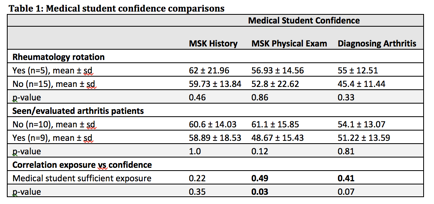Session Information
Date: Sunday, October 21, 2018
Title: Education Poster
Session Type: ACR Poster Session A
Session Time: 9:00AM-11:00AM
Background/Purpose:
A small number of previous studies show residents have low levels of confidence in rheumatologic and musculoskeletal (MSK) skills. The objective of this study was to evaluate pediatric trainee exposure to and confidence in Rheumatology skills at our institution.
Methods:
Fourth year medical students applying for pediatric residency and pediatric residents from a single institution completed an anonymous survey to evaluate confidence in MSK history, physical exam, rheumatologic lab interpretation and exposure to MSK pathology. Confidence levels were measured as continuous variables on a scale from 0 to 100.
Survey responses were compiled and summarized using frequency with percentages for categorical variables and means and standard deviations and medians with interquartile range (IQR) for continuous variables. Group comparisons between the rheumatology rotation and patients seen/evaluated with arthritis were assessed using two-sample t-tests or Wilcoxon rank sum or one-way ANOVA with post hoc Tukey adjustment for multiple comparisons. The rating of sufficient exposure of residents with confidence in MSK history, physical exam, lab interpretation and diagnosing arthritis was assessed with Spearman correlations for continuous variables. Two-sided p-values <0.05 were considered statistically significant.
Results:
All 20 medical students responded to the survey. Student confidence performing the MSK exam (p=0.03) and perceived ability to diagnose arthritis (p=0.07) was positively correlated with an increased perceived exposure to MSK pathology. This association was moderate-strong via Spearman correlation (0.49 and 0.41, respectively).
Of 160 residents surveyed, 63 responded. Resident confidence in interpreting rheumatologic labs and diagnosing arthritis was greater in residents who reported seeing/evaluating new-onset arthritis patients (p=<0.0001 and p=0.001, respectively). Greater level of perceived exposure to MSK pathology was associated with an increased level of confidence obtaining MSK history (p<0.0001), performing MSK exam (p<0.0001), interpreting rheumatologic labs (p=0.0009), and diagnosing arthritis (p<0.0001).
25% of residents and 50% of medical students reported no contact with a newly diagnosed arthritis patient.
Conclusion:
Lack of perceived trainee exposure to MSK topics correlates to less confidence in MSK skills. Yet, many trainees had never examined a new arthritis patient. Further studies are needed to investigate strategies to increase trainee exposure and confidence in MSK skills. Future studies should also evaluate trainee competence.
Image, Table, Graphic
To cite this abstract in AMA style:
Rutsky J, Salvator A, Ballenger L, Cuff S, Driest K. Pediatric Trainee Confidence and Exposure to Rheumatology [abstract]. Arthritis Rheumatol. 2018; 70 (suppl 9). https://acrabstracts.org/abstract/pediatric-trainee-confidence-and-exposure-to-rheumatology/. Accessed .« Back to 2018 ACR/ARHP Annual Meeting
ACR Meeting Abstracts - https://acrabstracts.org/abstract/pediatric-trainee-confidence-and-exposure-to-rheumatology/


